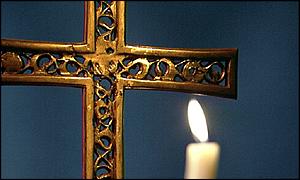 Religious people may be anxious about right and wrong |
|
See also: 13 Oct 99 Obsessive-Compulsive Disorder 23 Jul 99 Churchgoing improves life expectancy 12 Nov 99 Praying 'aids mental health' 13 Aug 01 'Religious struggle' could prove fatal 11 Jan 01 Black churches 'can help mentally ill' |
|
Internet links: New Scientist British Psychological Society Obsessive-Compulsive Disorder Obsessive-Compulsive Foundation Catholic Church in England & Wales |
Devout Catholics are more likely to show symptoms of obsessive-compulsive disorder than less religious people, a study has found.
The finding adds weight to the theory that a strict religious upbringing may make people more prone to the psychological problem.
Obsessive-compulsive disorder is an anxiety disorder in which people are persistantly compelled to carry out ritualised behaviour in response to recurring thoughts which are often completely irrational.
For instance, sufferers often become obessesed with the notion that they are contaminated with germs, leading to hour upon hour of washing.
The condition can become so bad that it prevents people from leading a normal life.
The causes of the disorder, which affects at least 5 million Americans and a million Britons, are still obscure.
But genes, upbringing, head injuries and emotional trauma have all been implicated.
New Scientist magazine reports that researchers from the University of Parma in Italy have found that committed Catholics are more likely to show symptoms of OCD.
Not conclusive
|
Common obsessions |
|
Fear of contamination Fear of causing harm to another Fear of making a mistake Fear of behaving in a socially unacceptable manner Need for symmetry or exactness |
Common Compulsions |
|
Hand washing Ordering Checking Praying Repeating words silently |
Each subject was asked to document mild OCD symptoms, such as intrusive mental images or worries. The more devout Catholics reported more severe symptoms.
The researchers stress that their study does not prove that religious devotion early in life causes OCD.
They say it is possible that people with a tendency to develop the condition may also be attracted by the religious lifestyle.
Dr Lynne Drummond, a psychiatrist at St George's Hospital, said that it was likely that people must have a genetic predisposition to develop symptoms of OCD.
However, she said many OCD patients do say they had a strict upbringing where actions were either right or wrong, black or white.
Personal responsbility
Ian Hancock, an expert in OCD from Dumfries and Galloway Primary Care NHS Trust, believes that although there is probably a genetic compotent to the condition, environmental factors, such as parenting, are likely to play an important role in its development.
He said people with OCD tended to have an exaggerated sense of their own responsibility for events, often when no blame could possibly be attached to them.
"As a religion catholicism does rather tend to emphasise personal responsibility, guilt and right and wrong.
"Any strong teaching that emphasises these issues in a very powerful way could be additional pressure for somebody who is prone to feeling guilt in the first place.
"It could well be a factor contributing towards the development of an obsessional-compulsive coping strategy."
Mr Hancock said it was important that devout Catholics who found themselves struggling with OCD took on board the broad teachings of the church, and tried not to focus exclusively on the elements that emphasised personal responsibility.
A spokesman for the Catholic Bishops' Conference of England and Wales said: "This survey needs to be taken with a pinch of salt.
"It would very interesting to know the size of the sample on which it was based.
"Certainly, I have heard of no Catholic clergy in England and Wales who even have the symptoms of obsessive-compulsive disorder."
There is evidence to suggest that a religious belief can aid mental health.